Columbia House Twilight Zone VHS Tapes!

Many moons ago, from about 1989-1999, until DVD became a new medium, Columbia House sold the original 1959-1964 Twilight Zone series on 43 VHS tapes. They were outstandingly produced with wonderful bumpers for each episode - the black screens with twinkling stars and eerie music by Fred Steiner (extracted from his score for "A Hundred Yards Over The Rim") that popped up on the screen with the title and original broadcast date...the folks at Charlex Productions did a PERFECT job with the animation. The tapes were very high quality, and also packaged very well in nicely-designed boxes that also included wonderful cardboard covers, versus "printed on the back of the box" ones that most media has. They included detailed program notes for each episode on each tape. These notes were mostly extracted from "The Twilight Zone Companion". A tape would come every 4-6 weeks, until the subscriber cancelled the subscription. Each was $19.99+$3.95 shipping, $23.94 total. At an average rate of 5 weeks per tape arrival, it took just over 4 years for anyone who dared finish their complete subscription to receive all of the tapes!
The main reason that these Columbia House VHS tapes of TZ were popular was because TZ had not been seen in un-cut form, literally, since the anthology first aired. Once the property was sold to CBS by Serling in 1964, it was then re-sold into syndication packages that were aired by local affiliates. The hour-long episodes were not included in this, and it took more than 20 years - until the mid/late 1980s - for them to re-surface. And even then, many affiliates chose not to air these at all, preferring to stick with a single half-hour episode. The original prints were not cleaned up when they did this, and even into the 90s-2000s, the prints aired by the Scifi Channel were the same dirty old ones that had aired for many years before that. While he was alive, Serling was not at all happy about how badly some of the episodes were chopped down even more, to allow for more commercials. So, the tapes represented the first "clean-up" of the original prints, and every episode was presented in completely unedited form. Speaking of the credits at the end of the show, they were very slow and visible in those days. Over time they have literally become all but invisible.
These tapes were not released in order of original episode air date. They probably should've been, but Columbia House had a good reason (or more than one reason?!) as to why they did not. From a marketing perspective, it wasn't practical. As most people know, TZ was a rather uneven show. Its episodes varied in content - even some of the greatest ones were unusual. So, they had to even it out, by having a varied mix of content on each tape. Some of the tapes clearly had themes or common threads among the 3 or 4 episodes on the tapes (only one tape had two episodes on it, both hour-long ones from Season 4.) The argument of course is that the producers - namely, Buck Houghton - did this from week to week, of airing a variety of story types, so why not just release the tapes in chronological order? But they didn't do that. They mostly left the lesser episodes for later tapes, causing a lot of people cancelled their subscriptions and only purchased half or less of the 43 tapes. They did, however, save "The Bewitchin' Pool", the very last episode originally broadcast, for the very last episode of the very last tape.
To see the liner notes, click "PAGE 1", "PAGE 2", etc. for each. You might find, depending on the browser or phone screen you are viewing these on, that the images may be slightly blurry - they were taken with a phone camera, versus an old-fashioned flatbed scanner. Depending on the browser, you might be able to click on them and they will enlarge a bit. With a few exceptions, they are all at 600x800 resolution, to keep the file size modestly low.
NOTE 2: Except for Tape 1, I do not remember, or have a listing of, the order in which these tapes were distributed to the buyers. I did have a copy of it at one time - I requested it from Columbia House and they mailed it to me - it looked like it came off of a very primitive dot matrix printer, as I recall! But it has long since left me. The tapes were also not numbered 1,2,3, etc. on the boxes which would've been helpful. There were indeed some numbers in very small print on the boxes but they didn't seem to correspond to sequential tape numbers. This is surprising, because as a whole, the collection of tapes was quite impressive and distinguished-looking. To this end, I have organized the listing of these in a "best estimate" way, of approximately the order that they were probably released in. I do remember that the last tape contained the last episode originally aired - "The Bewitchin' Pool". People remember the beginning and the ending; the middle happens.
Note: Columbia House no longer exists, just in case anyone may not have heard. The halcyon days of "8 records (later cassettes and CDs) for 99 cents each plus shipping and handling when you buy another 8 at regular price" are gone. Columbia House was one of those period companies that had its heyday and once everything started to go digital, it either went bankrupt or wisely backed out of the market before it actually did. They never had a tremendous level of success with DVDs, although they did offer them for such shows as "The Carol Burnett Show" and a number of other shows, for awhile. To my knowledge, they never released TZ on DVD, but they had plans to. Details below!!
TAPE 1: PAGE 1 PAGE 2 PAGE 3 PAGE 4 PAGE 5
Carol Serling Message, "The Invaders", "One for the Angels", "Eye of the Beholder", "The Lonely".
Good starting tape costing $4.99 plus shipping, with good contrast of episodes - two superclassics ("Invaders" and "Eye") and two solid average ones. Maybe not the best combo of episodes to put on the first tape - personally I'd have thought "To Serve Man" would be one of the ones on the first tape, and perhaps "Walking Distance." Different management, different decisions. But despite the odd choice of episodes, they're all solid ones that give this very first of nearly 4 dozen tapes a very good timbre. The tone of the ones selected is good and makes for a good balance of episodes...hopefully hooking the customer and making them want to continue the subscription. Two of TZ's finest "resident" composers can be heard on this tape - Bernard Herrmann's scores are heard on three of the four episodes, and Jerry Goldsmith on the very first one presented, "The Invaders." "The Lonely" also marks Jack Warden's first appearance of two in the first season - he came in as a last minute replacement later in the year for Paul Douglas in "The Mighty Casey"; filming wrapped and Douglas died a few days later and the network didn't want to air it. "The Lonely" was the first of multiple appearances - usually uncredited - of James Turley, who was (to my knowledge) a stunt double for Cayuga Productions. He was also Cliff Robertson's long-time stunt double for many years. Comments on the liner notes... Superb - mostly. There is a huge, glaring error on "The Lonely" notes though - it says it was the inaugural episode of the first season! Nope..."Where Is Everybody" was! And it really should've been on this first tape. Very curious as to why it wasn't, but then again, Hollywood is not known for good decisions, especially about things like this. Anyway, smaller details aside, Columbia House really went out of their way on some of these. As TZ was one of their best-selling subscription series of the Video Library, they took extra care to make it very good and inviting and appealing. I should know - this was my VERY first intro to TZ and Columbia House did hook me! (Well, for 10 tapes anyway, then I cancelled...and they still made their money off me.) The rest is history, and oh what a history it's been.
TAPE 2: PAGE 1
"Time Enough at Last", "The After Hours", "The Changing of the Guard", "The Monsters Are Due on Maple Street"
This was one of the first tapes in the subscription series - maybe like the second or third tape, with all episodes by Rod Serling, three of which came from the first season. "Changing Of the Guard" was the final episode of the third year of the show, aired in the spring of 1962, but it was a Christmas episode! But the title couldn't have been better - TZ was cancelled after it aired. The guard changed during that time; almost everyone on the production staff of years 1 thru 3 was gone by the time the show returned 6 months later in the hour format. Comments on the liner notes... What's with writing "Merry Christmas Ellis" on "Changing of the Guard"? Sarcastic for no good reason. Always nice to see 4 photos included in the liner notes. The one of Anne Francis and her doppelganger mannequin - oddly, that was the one they did the least well with. The ones made of Elizabeth Allen and John Conwell looked EXACTLY like them, but Anne's was a bit off. It didn't stop them from giving it to her - she kept her straw hats on it for many years. The actor names listed on the notes are quite incomplete, as was often the case. "Monsters" left out Mary Gregory, who played Jan Handzlik's mother! "Changing" misspelled Philippa Bevans (as Philipps) and omitted Tom Lowell, who was quite a popular character actor then. Russell Horton's name is also missing; he appeared on "In Praise of Pip" in Season 5. Buddy Hart, later to become stuntman Buddy Joe Hooker, likewise got no mention. The two guys they did mention are barely identifiable - are they the ones who called him "Old Weird Beard"??
TAPE 3: PAGE 1 PAGE 2
"The Silence", "Kick the Can", "A World of Difference", "And When the Sky Was Opened"
Four classic episodes, to be sure - and perhaps the unlikeliest one of all went on to have the greatest popularity - George Clayton Johnson's "Kick the Can", which appeared later as a re-make in "Twilight Zone - The Movie." Matheson wrote "A World of Difference" and Serling adapted his short story "The Disappearing Act" into the magnificent "Sky" teleplay. For some reason, "World" and "Sky" are always a really good pairing of episodes from Season 1. "World" has to do with a man's escape from reality - and it's a script about showbiz and those are always fun, and "Sky" involves complete disappearance. In the end, the characters cease to exist. Although I never met Doug Heyes who directed "Sky", I was fortunate enough to know Ted Post, who lived 95 years. He said, "Howard Duff and Eileen Ryan were outstanding. What a brilliant script. And then...I didn't come back to Twilight Zone again for 4 more years because I was so busy directing other shows." My old friend Gloria Pall did not get screen credit for her prominent appearance (and 2 lines) in "Sky", but she did have a postcard from Buck Houghton sent to her at the end of the season telling her that the episode would be re-broadcast that summer...its first rerun. She kept the postcard until the end of her days. And Gloria LOVED TZ reruns - and not just her episode! Comments on the liner notes...Disagreement about "The Silence" being one of the most talked-of. Although the punchline is memorable, it's only slightly above average compared to many other segments. In addition to the anecdotes given, I will add this one from Jonathan Harris: "Franchot Tone was drunk every day of the shoot. I'd come in in the morning and reeked of bourbon." The liner notes were released long before "The Truman Show", which was definitely a takeoff on "A World of Difference."
TAPE 4: PAGE 1 PAGE 2
"The Obsolete Man", "Long Distance Call", "What You Need", "A World of His Own"
The first two are superclassics, despite not being the greatest of stories necessarily. The last two are merely enjoyable and pleasantly and enjoyably ho-hum. "A World" has a bit of terrible editing in the shot where Phyllis Kirk is one-on-one with the elephant...watch closely for the bad jump cut. Matheson later stated that "A World of His Own" was the only episode where an actor didn't deliver his dialogue word-for-word, and that was Phyllis Kirk. Somehow she made it work though, and delivered a very funny performance. "What You Need" also has a bit of bad editing...in the teaser, the smoke trails back towards the cigarette of Steve Cochran as he's sitting at the counter! Comments on the liner notes... Strange quote from Burgess Meredith about Fritz Weaver and Weaver's decision to accept the role. James Sheldon, who directed "Long Distance Call", and Del Reisman (story editor/associate producer) both attested to not only the shot of the "dead" Bill Mumy being shot, but that Mumy's mother was nice and let him work longer hours so they could shoot it and other scenes. They also said that the shot was omitted because the network would never have allowed it - "you never know what kids might try to do after they watched TZ!", said Reisman.
TAPE 5: PAGE 1
"Night of the Meek", "Mirror Image", "The Grave", "The Masks"
Four of the best in the series, all except "The Grave" were written by Serling. "The Masks" was the last really great script he wrote for TZ, and of course, directed by Ida Lupino, the only female to direct an episode of the series. They should've put "The Sixteen Millimeter Shrine" on this tape too, which she starred in. "The Grave" was one of a handful of episodes by Montgomery Pittman, who in a way was like the other Earl Hamner of the series, although today he is pretty well forgotten, no doubt due to his untimely death in 1962 at age 45, during the middle of TZ's run. His episodes "The Last Rites of Jeff Myrtlebank" and "The Grave" are positively Hamneresque, and absolutely wonderful. Pittman was the only writer of TZ to also direct all of the episodes he wrote. Comments on the liner notes... Bad on "Mirror Image", one of the series' greatest. Millicent Barnes "ranks among the most pathetic and sympathetic TZ victims"?? Huh? The box cover states that the liner notes were adapted from "The Companion", but they should've included Zicree's great lines from the book, "Without trust, there can be no survival" and "TZ at its most malevolent, presenting a world where threatening, destructive forces hold the upper hand." To this I will add also, much of the music in it is from Bernard Herrmann's "Brave New World" suite, and also some clips written by Jerry Goldsmith including one called "Silent Flight." For "The Grave", they should have mentioned a bit more about Montgomery Pittman, who was indeed a major TZ player who directed and/or wrote-and-directed a total of five episodes.
TAPE 6: PAGE 1 PAGE 2
"Living Doll", "To Serve Man", "Judgement Night", "In Praise of Pip"
Very strong tape with two of the finest in the series (the middle two). The last two are two of the best war-themed episodes in the series. Typo: "The Living Doll" should be "Living Doll", which was the title of Jerry Sohl's script. Comments on the liner notes... Ridiculous last line of the "Living Doll" notes, "If you're ignore your fears, they'll swallow you whole because this is The Twilight Zone." Got anything else better? Or are you just trying to sell more product? The back cover doesn't state who wrote the notes though! Zero mention of June Foray other than "Featuring the Voice Of..." For "To Serve Man", no mention of Joseph Ruskin who dubbed all of Kiel's lines. No mention of Lloyd Bochner, Serling's then neighbor in Pacific Palisades, who played the lead role of Chambers. Bad typo in the "Pip" note, "Billy Mummy"! Pretty good notes on "Judgement Night."
TAPE 7: PAGE 1 PAGE 2
"Walking Distance", "Nightmare at 20,000 Feet", "The Midnight Sun", "The Purple Testament"
Four of the best episodes in the series and among the most popular. One of the best tapes - with some of the best music from Bernard Herrmann in "Walking Distance" and some in "Nightmare", Van Cleave's score for "The Midnight Sun" and Lucien Moraweck's score for "The Purple Testament." Incidentally, a historian who knew Van Cleave mentioned that other than a few of his TZ scores appearing on the 40th Anniversary TZ Soundtrack CDs, no albums of his music for TZ or other shows has ever been released. Really a shame. Comments on the liner notes... Pretty good on the first three. However, the half-photo of Reynolds on "The Purple Testament" looks like it came from a high school yearbook. Further, it has since been confirmed that CBS did not take TZ off the air after director Richard Bare and star William Reynolds were involved in an air crash earlier in the day. It seemed as though everyone associated with the show, including Reynolds, always remembered this incorrectly.
TAPE 8: PAGE 1 PAGE 2
"Where Is Everybody", "The Jungle", "Perchance to Dream", "Nick of Time"
An outstanding tape. As mentioned earlier, odd that they wouldn't put the pilot episode, "Where Is Everybody" on the first tape. Two Charles Beaumont episodes, "The Jungle" and "Perchance to Dream" - both of which are outstanding. Beaumont was arguably the finest of the TZ writers - but he wasn't contracted to write any certain percentage of the show as Serling was. Beaumont was superstitious and scared of everything and had a warped sense of humor, as all of his surviving colleagues attested. "Nick of Time" was a Matheson script, and one of his best indeed. Comments on the liner notes... Nice that they included some comments from William F. Nolan. Nolan did not write for TZ but he was mentioned in a handful of episodes, or characterized (Big Phil Nolan in "The Prime Mover" and Mrs. Nolan in "Death Ship".)
TAPE 9: PAGE 1 PAGE 2
"Mr. Denton on Doomsday", "The Shelter", "The Lateness of the Hour", "The Trouble With Templeton"
I can call this the Mary Gregory tape! What a great lady she was. She appears in the middle two episodes. Her co-star on "Lassie", Sandy Kenyon, appears with her in "The Shelter" - one of hundreds of episodes of TV where TZ actors appeared together. This tape...it has an average one, a controversial one, another average one, and a superclassic that is never talked of, in that order. Comments on the liner notes... Jeanne Cooper is not mentioned for her fine performance in "Denton" which is peculiar, given that she went on to become one of the greatest and most beloved soap opera stars. Like Constance Ford, who was also a sterling actress, her early work was pretty well forgotten after thousands of soap episodes later. "The Shelter" is called a favorite - and actually I remember it came in at #1 in 1995-96 on the Scifi Channel's poll done at that time. I've never understood this. It's one of maybe two episodes that I absolutely do not like, the other being "The Gift"...but enough about me. Racism in TZ has no place. The anecdote - and a funny one at that - shared by John Hoyt of "Lateness" has a very weird error. There is no such thing as "Tramontium". It's not an element, nor an alloy from what I know of my knowledge of chemistry! Maybe he meant titanium? Or strontium? More space should've maybe been given to "Templeton", given what a truly forgotten gem of TZ that it has always been.
TAPE 10: PAGE 1 PAGE 2
"The Dummy", "Nothing in the Dark", "Shadow Play", "The Sixteen Millimeter Shrine"
Four outstanding ones. Literally, four home runs. Except for one thing... Martin Balsam ("Sixteen Millimeter Shrine") had trouble in his two TZ episodes. In both, he seems stiff and frustrated, and I'm not the only one to notice this, I've heard it from a few other reviewers as well. Comments on the liner notes: For "The Dummy", it's interesting that so many actor names are mentioned, especially those who had one-line or no-line parts (Rudy Dolan, Sandra Warner.) Wright King, who played Paul Carson the newspaper man in "Shadow Play", related, "I had to play drunk in that - a drunk newspaper reporter. I'd never played a drunk guy before. And looking at it now, I see that I still smoked, and in the episode too!" Well, Wright - despite your smoking, you lived to be almost 96 and you played a drunk guy VERY well indeed!!
TAPE 11: PAGE 1
"Death's Head Revisited", "People Are Alike All Over", "A Hundred Yards Over The Rim", "Five Characters In Search Of An Exit"
Four very powerful episodes back-to-back. This is definitely a "thinking person's" grouping of episodes with tons of food for thought. I remember the first time I watched this one after getting it in the mail, I had no smile on my face after watching it. Particularly the last one - it's got a clown in it, but no happy ending. "Death's Head" is one of the most poignant episodes in the series, and not in a pleasant way. It was definitely written by Serling to remind everyone of the horrors of the holocaust. "A Hundred Yards" is one of the greatest in the series. And in "People", we see a grown-up Roddy McDowall, then aged 31 in all his glory. Comments on the liner notes... Good last line of "People Are Alike" about "a final twist that chills right to the soul." Indeed, it does. Watching Roddy throw down that sign behind those bars...oooh! The lead in "Five Characters" was intended for Richard Widmark, who turned it down due to the salary for the week being too low. As always happens, the part went to the best possible actor for it - William Windom, who accepted the low salary but turned in one of the greatest of performances. His outburst of "WHO ARE WE?!" is definitely a staple quote of TZ history.
TAPE 12: PAGE 1 PAGE 2
"A Stop at Willoughby", "The Last Flight", "Night Call", "The Last Rites of Jeff Myrtlebank"
An outstandingly good one - with a thread that might be a bit hard to find but it's there I think. All of these episodes are about long-ago times. "Willoughby" involves a trip inside a man's mind back to 1888. "Flight" (actually the original title of it was "Flight") involves a WWI pilot, "Night Call" is about a woman who has remained stuck in 1932 - she lives in a remote colony and stuck in a time warp, and "Jeff" is a classic old Hamneresque tale about the deep South even before the Great Depression. This was one of the early tapes of the bunch. They would not have made this a later tape. Comments on the liner notes... Pretty darned good. Trivia - Sherry Jackson, whose acting career for some reason completely dried up by about 1980 despite being rather a supermodel for many years - was the stepdaughter of Montgomery Pittman. Pittman was one of the unsung heroes of TZ - he wrote and directed three episodes, and directed two more.
TAPE 13: PAGE 1 PAGE 2
"A Quality of Mercy", "The Last Night of a Jockey", "Long Live Walter Jameson", "The Howling Man"
Two Serling episodes followed by two legendary Charles Beaumont episodes. "A Quality" was actually a better story than "The Purple Testament", which was intended for Dean Stockwell who unexpectedly called in to cancel the night before shooting was to start (as Ron Masak remembered, production was held up a bit because of it). "Jockey" was a poor re-make of "Nervous Man in a Four Dollar Room". This was actually a very good tape despite the one weak episode, as it gave four distinctly different stories, with two DISTINCT kinds of writing. Mind you, there were, and still are, people out there who think that Serling wrote the whole series! The other writers are pretty well forgotten outside of those who really know the show well. Comments on the liner notes: Less notes on "Jockey" and more on "The Howling Man" would've been good. But yes, "ideal collaboration between actor and writer" is a good way to summarize the Serling-Rooney relationship. He knew how to write for Rooney and Rooney knew how to portray Serling characters, as he had so well in "The Comedian" many years earlier. Interesting note about "A Quality of Mercy" shooting location at the old Hal Roach Studios - they shot a few other episodes there including "Two" earlier in the season. But unlike "Two", the sets for "A Quality" were laughably bad. But remember - that was TV in 1961. In other words, not high resolution. But it was made up for with the makeup job on Stockwell, and not a heavy one...as has been mentioned elsewhere, he was more believable as a Japanese soldier than as an American one, right down to a pretty convincing Japanese accent.
TAPE 14: PAGE 1 PAGE 2
"Little Girl Lost", "A Game of Pool", "A Short Drink from a Certain Fountain", "It's A Good Life"
A tape with a good amount of story variety - three popular episodes, and a dud ("Short Drink.") "Little Girl Lost" was one of those episodes that had its production problems, but still came out okay despite it. Some of the prints of this episode, found in other places, show the wall chalk marks - quite clearly erased - behind Serling as he is giving his opening intro! Maybe by now, someone has taken the time to digitally erase them too. Two superclassics, "Pool" and "Good Life." One of the biggest flubs in TZ history is in "Little Girl Lost" - the chalk marks drawn by Charles Aidman are on the wall when Serling gives his opening intro...before they were even drawn! Comments on the liner notes... The notes for "Short Drink" are a bit silly. Mean-looking photo of Klugman. Now, I present a challenge to the reader.... Just how much does "It's a Good Life" parallel the world today? Think about that for a second. Last line of the "Little Girl Lost" notes...not many people would agree with it being one of the best. The TZ Companion review about it is far harsher than what is written here, stating that Charles Aidman is the element that kept the whole thing from crashing into a wall...no pun intended...or words to that effect.
TAPE 15: PAGE 1 PAGE 2
"Person Or Persons Unknown", "Miniature", "King Nine Will Not Return"
Looking at some of the above tapes listed, you might notice a pattern - I think they sometimes selected episodes based on length of the title (short one-word title, one with a two-word title, and one with a longer title). Maybe it was a conscious thing, maybe not, who knows? I'd love to know who made the decisions on what episodes to include. This is a good example of a tape that will really resonate with most viewers as to the depth that TZ went to in so many of its storylines. The thread of the first two is "mental problems" and "identity crisis/confusion." Look for director John Brahm playing Winston Churchill in "Persons." Both episodes had extraordinary lead actors. Richard Long did not have a long life but what a great talent he was. "King Nine" was only an average episode for a few reasons. From a production standpoint, it was quite remarkable that they had this beat-up old plane, made to look like it had crashed, that was later reassembled and flown away. Serling's script was a typical "Serling story about war", and it's fine but Bob Cummings was all wrong for the part and he delivers a lot of his voiceovers as if he were reading right off the page. I will never forget Del Reisman telling me about "a greasy diner we were forced to eat in every night out in the desert - I was eating all the junk food and Bob Cummings was eating this food that he'd either brought in or had someone send it on location to him and he was telling me, 'Del, you can NOT eat that unhealthy garbage! It's not good for you! You are what you eat!' But I had no choice really." Comments on the liner notes... Last two paragraphs of "Person or Persons Unknown" are a tad ridiculous. George Clayton Johnson's ideas were sometimes a bit hard to grasp - they made sense to him, but not to many others. "Another look at infinity?" Huh?
TAPE 16: PAGE 1 PAGE 2
"The Odyssey of Flight 33", "The Hitch Hiker", "Steel", "Two"
An outstanding tape with 4 outstanding episodes. The first two episodes by Serling, "Steel" by Matheson, "Two" by the great Montgomery Pittman, who was very much equal to all of the other writers for the show. He was the first TZ writer to die, I believe, and he died literally at the end of Season 3, June 1962, after finishing his work on the show. Comments on the liner notes: again, 4 good photos. Typo on "The Hitch Hiker", they say that the Hitch Hiker is Leonard Stern. It is Leonard Strong. Leonard Stern was a TV writer, prolific in the 1950s ("The Honeymooners, etc."), not to be confused with Leonard Stone, a great character actor who should by rights have gotten a part on TZ. The credits listed in the notes omit Bernard Herrmann, who wrote the music for the episode. Van Cleave, who wrote the amazing music for "Steel", is also not mentioned in the notes as it most definitely should've been. What many people don't realize is that a full orchestra was not used for hardly any of the music done for the series. The ensembles were sometimes as small as a quartet. String orchestras were also used frequently.
TAPE 17: PAGE 1 PAGE 2
"The Mirror", "In His Image", "Nightmare as a Child"
Three episodes with very little to do with each other. One of the best, but least-discussed - "In His Image". One of the most forgotten - Peter Falk's episode, "The Mirror". And last but not least, Terry Burnham's performance of her lifetime - in "Nightmare as a Child." Arguably one of the best, but if not that, then definitely one of the very few that left an in impression on many. Thankfully, they didn't leave "In His Image" for a much-later tape. It'll be interesting to see if it gets more popular as time goes by. It should. Even producer Herbert Hirschmann remarked at how magnificent it was. But I think the fact that TZ had gone to an hour resulted in a significant viewership drop and then the hour episodes were never aired again until about 1984. Great art sometimes has to be forgotten before it really becomes well-known much later. I've said it before and I will say it again - Terry Burnham's life was indeed changed because of her TZ appearance. Of the kid actors who appeared on the show, Terry blew all the rest of them away with this very difficult role that she surmounted with aplomb. Comments on the liner notes... Not a good set of liner notes, with a lot of empty space as you can see. In the liner notes, it states that Falk "struts and raves and rages", but in The TZ Companion book, it says "rants, raves, and struts through a thoroughly superficial portrayal." Oddly, the book also shows a photo of what looks like a very nice man laughing! The liner notes also talk about "Nightmare" as something that was reality-based and that could happen in our everyday world, and then it goes on to talk about Janice Rule's eyelashes (which indeed were very bad!) In the TZ Companion, it says, "the child is little more than harsh and irritating." The reviewer missed the point about the child, and Serling's script was no different than most of his others...about extraordinary situations experienced by ordinary people.
TAPE 18: PAGE 1 PAGE 2
"The Arrival", "Showdown with Rance McGrew", "Hocus Pocus and Frisby", "No Time Like the Past"
One of the more unusual tapes and one of the longer ones. All episodes written by Serling, with "Showdown" and "Hocus" based on ideas by Frederick Louis Fox. They had to fit a third half-hour episode onto it, not just two, as they usually did with the tapes containing hour-long episodes (two half-hour ones, one hour-long one), so more tape was needed for this one than any of the other tapes. The three half-hours all come from Season 3 and are average at best - two comedies and one very dramatic one ("The Arrival.") The thread for this tape is legendary character actor Robert Cornthwaite, who appears in two of the episodes ("Showdown" and "No Time.") "No Time" is considered one of the worst in the series/one of the worst of the 18 hour episodes but...one man's trash is another's treasure! But yes, by the fourth season, the show was starting to copy itself, and this was almost always the case when Serilng was writing - but the audience of the time was undoubtedly not much aware of it. Interestingly, "No Time" was the most expensive ever produced at around $170,000, a princely sum for 1963! Doctors and dentists of that time only made about $15,000 a year, some even less. Let's face it, "McGrew" wins the award for most tongue-in-cheek-ridiculous TZ. Oddly enough though, I have never heard it mentioned as among the worst. Comments on the liner notes... Pretty good. Serling says that "I gave better dialogue to the horses than the actors" in the "McGrew" notes but I think he underestimated himself. He usually did well with western-themed episodes and also army episodes. Where he fell down was comedy. Fredd Wayne confirmed, "Yeah, we shot "The Arrival" at the Santa Monica Airport - it's a small airport, not like LAX, and I've lived in Santa Monica forever. Harold J. Stone and I were in other shows together, including an episode of "Lou Grant" about 20 years later." Indeed, Stone played a much more vulnerable man there than he did on TZ. Although he was Jewish, he played tons of Italian men very convincingly, and with Fredd Wayne as his attorney, he played a humble owner of a grocery store on "Lou Grant."
TAPE 19: PAGE 1 PAGE 2
"The Mighty Casey", "A Most Unusual Camera", "Twenty-Two", "The Encounter"
A most unusual tape as well - none of which were brightly-shining episodes, especially the latter three. "The Mighty Casey" was the TZ that was "re-done", after its original lead actor passed away and CBS did not want to use the original footage. Bob Sorrells, who stars as Casey, is, to my knowledge, the only TZ actor to commit murder and go to prison for the rest of his life. "The Encounter" is 'the banned TZ episode', although it has always been included on every release of the series on various media, including VHS and DVD! Comments on the liner notes... Very good notes for this tape. Weird photo for "The Mighty Casey"! Given, as the liner notes say, "Twenty-Two has an immediacy and visual freshness akin to a live TV broadcast", you'd think more TZ episodes would've been done on videotape. The reason the videotape experiment failed was because any would-be outdoor scenes had to be done indoors...no better an example being the final scene with the exploding airplane, which looks like someone lit a pack of Fourth of July sparklers and tossed them across the soundstage. The taxiing plane looked like a tabletop model was being towed on a string. Jonathan Harris: "Dear Barbara Nichols...such a funny lady, and a great loss to the industry [after her untimely death.]"
TAPE 20: PAGE 1 PAGE 2
"Dust", "The Bard", "The Rip Van Winkle Caper"
This was one of a handful of tapes with only three episodes - they always included one of the hour-long ones. Maybe a little disappointing to get one of these tapes unless all three episodes are really good. And in this case, they weren't. "Dust" and "The Bard" are not popular episodes. "RVW Caper" is a superclassic - not Serling's absolute best script but it was extremely memorable. The ordering of episodes of these tapes was probably good - start with a vignette, then the hour one, and another vignette which was hopefully better than the hour one. TZ at 60 minutes was not something most people liked and that's of course why it went back to 30 minute slot for its final year on the air. Comments on the liner notes... Funny that Jack Weston is mentioned only for "The Four Seasons", which was an awkward low-budget film. Surely people know him for more than just that! "The Bard" co-starred his then-wife, Marge Redmond, and it bore some similarity to their own lives as newcomers to Hollywood. (Incidentally his "Four Seasons" co-star was Carol Burnett, who appeared in a similar sort of TZ episode about her own life before she became famous). "RVW Caper" did not get enough discussion and there was enough space on the page for more commentary! Ironically, John Mitchum, who played Erbie (who dies first) was the last survivor of this episode. I remember inviting him, through a friend, to the first TZ convention but his health was going downhill and he died a month or so before it. Thankfully, his friend managed to get him to sign something for me - a computer print-out of a picture from the episode. Probably his last autograph. I still have it.
TAPE 21: PAGE 1 PAGE 2
"Mr. Dingle The Strong", "Of Late I Think of Cliffordville", "The Four of Us Are Dying"
Three average ones. People don't give "Cliffordville" much of a chance but they should - it's one of those episodes requiring a few viewings. Never pass up an opportunity to see something that Albert Salmi was in, he was one of the greatest TV actors in history. What more could you ask for with Don Rickles and Burgess Meredith in one episode? "The Four Of Us" was George C. Johnson's TV debut - and a classic example of how the actors and the director spun a mundane idea into gold. The last scene, featuring Don Gordon as Marshack and Peter Brocco as his dad, iced the cake. Comments on the liner notes... The "sexy and fun" description of Julie Newmar is a bit much...but they have to write it that way for the viewers who bought the tapes. Don't forget, liner notes can't be too critical, they have to be promotional! Keep the customers coming back for more.
TAPE 22: PAGE 1 PAGE 2
"Number Twelve Looks Just Like You", "Mr. Garrity and the Graves", "Once Upon a Time", "The Fugitive"
This might be called the J. Pat O'Malley tape...he appears on two of the four episodes. That is, four episodes that couldn't have been more different from each other - 2 from the last season (the first two), and 2 from the third season. Now, the thread could actually be the year 1890, in which "Garrity" and "Once Upon" were both set in. "Number 12" was set far in the future, and finally, "The Fugitive" in present-day. Froug's comment in the notes about using Suzy Parker not being an actress was kind of odd, as Parker had done her share of acting and would continue to sporadically for another decade. She appeared on an episode of "Night Gallery" later. It should be mentioned that Susan Gordon got top billing over J. Pat O'Malley in "The Fugitive"! The reason for this was undoubtedly because Susan was kind of a film star at the time. Her father, Bert I. Gordon, director of numerous old B-movies - who outlived his daughter by more than 12 years, also reached centenarian status - cast her as much as he could. Her mother, Flora Gordon, also lived to be remarkably old. O'Malley was one of those actors who was on TV just about every week through the 50s and 60s. He played every kind of old curmudgeon imaginable. She even got higher billing than Nancy Kulp, who was quite a hot commodity as an actress at the time. You know, the evil Mrs. Gann was a precursor to the character Eunice Higgins of "The Carol Burnett Show" played by Carol herself!! They even sound the same! Comments on the liner notes... Very skimpy on "Number Twelve" and "Garrity". John Tomerlin who wrote "Number Twelve", certainly had plenty to say about it in later years. The story for "Garrity" came from a sports writer from Utah named Mike Korologos, the last surviving TZ writer. Nice quote from George Clemens about it though - the grand cameramaster Clemens was one of the very few crew members from Season 1 who was still around at the end, although Robert Pittack and Charles Wheeler and Fred Mandl were doing more of the DP chores by the end. Marvelous comment by director Richard Bare about being a lazy person - he was about as lazy as a crocodile staring down a buffalo. His filmmaking/directing/producing career began when he was about 10 years old, making his own films, and his Hollywood career had begun even before he made about 60 "Joe McDoakes" shorts that were presented along with newsreels in the old moviehouses. Like Bert I. Gordon, he lived to be more than 100 years old. "Once Upon a Time" notes...again, these are much kinder than the ones in the Companion!! This was an episode that supposedly had a mountain of problems, but most of them are undetectable in the finished product. Definitely an episode that gets dissed undeservedly!
TAPE 23: PAGE 1 PAGE 2
"The Man in the Bottle", "Passage On The Lady Anne", "Probe 7 - Over And Out"
A yawny tape. A charming first episode, a rather charming hour episode, and one of Rod's last scripts for the show, which he admitted freely to Ted Post was not one of his best and that he was exhausted when he wrote it, telling Ted to just do his best with it (along with "The Fear" and "Mr. Garrity and the Graves.") Comments on the liner notes... Vivi Janiss, who was outstandingly good in "The Fever" earlier, is not mentioned in the commentary and her name is not listed alongside Luther Adler and Joseph Ruskin. Vivi was married to Bob Cummings ("King Nine Will Not Return.") She was a really, really good actress who had an even better role the season before in "The Fever" alongside Everett Sloane. Likewise, Antoinette Bower is not mentioned in the "Starring:" line. She is mentioned in the commentary, but once again, only in the context of being an actor who was also in "Star Trek."
TAPE 24: PAGE 1 PAGE 2
"The Trade-Ins", "Third from the Sun", "The Fever", "The Prime Mover"
Perhaps this one could be called "The Gambling Tape", because of the latter two, that featured the same slot machine, and even the same musical cues by Jerry Goldsmith. The first two also have a scene featuring gambling. "The Trade-Ins" was one of Serling's personal favorites, and "Third from the Sun" was adapted by him from a very short and simple story by Richard Matheson - a prime example of Serling in his prime as he spun the straw of bland stories into golden teleplays. These four featured some of the greatest talents to appear on TZ - Joseph Schildkraut, Edward Andrews, Fritz Weaver, Everett Sloane, Vivi Janiss, Dane Clark, Chris White and Buddy Ebsen. And my old friend Edson Stroll in the display case, later emerging as Young John Holt. Comments on the liner notes... No mention of Christine White in "The Prime Mover", who submitted a bravura performance and later appeared on "Nightmare at 20,000 Feet"? Interesting thing about "Third from the Sun" - it was a very, very forgettable short story by Matheson with no character names! Serling absolutely wrote that episode 99% from scratch. Edson Stroll remarked on "The Trade-Ins", "I always thought it was me and Donna in the display case - I didn't realize it wasn't her until I saw it again recently! And how did Elliot Silverstein get that pained expression on my face when I realized the transformation was a mistake? He fired a gun off on the set after turning all the lights out suddenly!"
TAPE 25: PAGE 1 PAGE 2
"A Piano in the House", "Still Valley", "Dead Man's Shoes", "The Jeopardy Room"
Another mixed bag of not-great episodes, but hey, is TZ ever bad? Not much. Sometimes it was just less good. The middle two episodes usually get less than they deserve, particularly "Dead Man's Shoes", which was one of the few episodes that takes place in a cycle, where the end matches the beginning. "The Jeopardy Room", like "A Piano", was a bit of an outlier in that it lacked a fantasy element, and seemed more like a vehicle for Martin Landau than anything else - despite it, it's an effective simple story. Barry Morse, who starred in "A Piano", very much enjoyed the part but it was always one of those episodes that never was really remembered, and part of it was because of Hamner's quote, "I'd never met a theater critic, but it was my idea of what a critic was like." Once things get published, they're out there for good. Comments on the liner notes... I'll just say right now that these four episodes were terribly shorted and even dissed in The Companion and the commentaries aren't much better here. Great anecdote about director David Greene, who directed "A Piano in the House" - he must've been referring to the sales pitch that Serling did to the network about TZ, wherein he discusses a few of the already-produced episodes, "The Lonely", "Escape Clause", and then the pilot, "Where Is Everybody?" Greene and Barry Morse were old friends and reunited at the TZ Convention in 2002, although we did not know Greene's whereabouts and sadly did not invite him to attend. He showed up, but too late, on Sunday after we'd already had the panel discussions. "Tequila with a cube of sugar" in "Dead Man's Shoes" was originally "tequila with lemon". An outstanding film noir-type episode that definitely deserves more than it ever gets. Ben Cooper, who played Dauger in "Still Valley", said, "The guys who had to play the frozen people were terrific...I was obviously not one of those characters but they could go off and have a cigarette or lunch or whatever and come back and they'd be exactly how they were before. Jim Sheldon was a great director - he wasn't gonna make you look like a jerk. Gary Merrill was so intense that Jim told me to play my part down because otherwise it would've been two of us throttling each other." Indeed, Gary was required to belt Ben across the face!
TAPE 26: PAGE 1 PAGE 2
"Escape Clause", "Jess-Belle", "The Long Morrow"
"Escape Clause" was one of the very first scripts that Rod did for the show and "The Long Morrow" was one of the last. In between, we have an Earl Hamner Season 4 episode that most concur was his best one that he wrote for the show. Comments on the liner notes... Nice randomly-placed photo of Rod! "Escape Clause" was one of the first episodes Serling penned, and one of the first produced of TZ in the summer of 1959. It was also one of the ones he used in his network pitch to the series. David Wayne, as hypochondriac Walter Bedeker, was one of those fine actors who was popular but today is barely remembered. He co-starred on the series "House Calls" for a few years, 20 years later, interestingly enough (those who know the TZ episode know that he was the patient in a house call at the beginning!) The great Jeanette Nolan's two appearances on the show were in Hamner scripts, interestingly enough. As for "The Long Morrow" having a memorable payoff - well, maybe not that memorable. The storyline is terrible and it's Hartley and Lansing who make the 24 minutes work...also, the over-narration by Lansing was a nice touch, not found in more than one or two other episodes including "The Hitch Hiker". Hartley related in 2004, "He drank a bit and I did too I guess, and we got to know each other - and I think, together, we - as the two characters - came across quite convincingly." Hartley got the part after she ran into Serling again not long after relocating to Hollywood in the early 1960s. While she lived in Westport, Connecticut, she got him to come speak to her high school class.
TAPE 27: PAGE 1 PAGE 2
"Sounds and Silences", "Mr. Bevis", "Mute"
Ann Jillian's performance in "Mute" is about all this tape had to recommend it. Two one-star half-hour episodes (the first two) and one of the most controversial episodes in the series. It makes sense that this was a very late tape - they were saving the least for last. Comments on the liner notes... "Mute" was scorned very harshly in the TZ Companion. Ann Jillian is called "a lovely and wonderful actress" on the box of this VHS tape, but in the book, literally the only comment about her is, "years later to play a sexpot on TV's It's A Living." Like Terry Burnham before her, she far out-performed the adult actors. Apparently some of the really good anecdotes compiled for "The Companion", like the one on about Herbert Hirschmann being first choice to direct this episode, but who didn't - were scrapped, or saved for another time...like for these liner notes.
TAPE 28: PAGE 1
"The Thirty Fathom Grave", "The Parallel"
Two of the perhaps 10 most forgotten episodes in the series, both from Season 4, and naturally, both 1 hour long. The former was more like an educational filmstrip than an episode of TZ, although it did have that certain measure of TZ spookiness. The latter was one of the more original episodes in the series and had a unique storyline. Unfortunately, the director did not stress a fast-paced dramatic progression and it just turns into a rather pointless, sleepy affair despite a few gripping moments. They should have put "Thirty Fathom" on another tape and put "No Time Like the Past" on this tape. After all, the two episodes were aired back to back and starred The Andrews Brothers - Steve Forrest and his elder sibling Dana Andrews. Comments on the liner notes... Perhaps the worst in the set of tapes. I'm lovin' the big blank space below the "Thirty Fathom" notes...at least put a photo there. Interesting how Herbert Hirschman refers to Serling as "a darling man", when in 'other books' he talks about the fights he had with Rod. "The Parallel"'s notes are terrible, although the quote from Anne (misspelled Ann, although she is known in her family as Nan), is quite welcomed. Other than that, there's no real commentary on the episode itself, or the outstanding actors Steve Forrest, Jacqueline Scott, Phillip Abbott, and Frank Aletter. Scott turned in a particularly superb performance that gets no mention here.
TAPE 29: PAGE 1 PAGE 2
"I Dream of Genie", "Ninety Years Without Slumbering", "Ring a Ding Girl"
The first two are weak, but the final one is one of the best in the series, and may be Hamner's most significant contribution to the series. Like "The Trouble With Templeton" and a handful of maybe 5-6 others, it is also one of the least discussed. Comments on the liner notes: Shame on them for not mentioning James T. Callahan and Carolyn Kearney as starring actors in "Ninety Years", and only listing Maggie McNamara in "Ring a Ding Girl". Mary Munday should have been listed in the starring cast, along with David Macklin and even Hank Patterson and George Mitchell (not to mention Vic Morrow, who was the Control Voice of "The Outer Limits"). The commentary on "Ring a Ding Girl" is silly, taking a detour into what Hamner thought about Serling.
TAPE 30: PAGE 1 PAGE 2
"Static", "The Gift", "The Brain Center at Whipples", "The Fear"
Four inferior ones - possibly the weakest tape in the batch. "Static" was shot on videotape and the prints of this one in particular were not as good as some of the other videotape ones. "The Gift" is one episode where Rod completely fell down, but it did have Geoffrey Horne from The Bridge On The River Kwai. "Whipples" was shown on a TV set in The Smithsonian - a clip from it, predicting the evils of automation, played for many years. It bears the distinction of having two Richard D's - Deacon and Donner. "The Fear" and "Whipples" were among the last few episodes originally aired. Comments on the liner notes... Peter Mark Richman became "Peter Mark" about 20 years before this tape was issued and that's what everyone knew him as...except whomever wrote these liner notes apparently. At least they called him a television perennial, because he certainly was having appeared on over 500 episodes of television in just about every kind of show. Robby the Robot, as described by director Richard Donner, sounds like an old relic. It was used in "Forbidden Planet" in 1956. It has long since passed to a private owner who - on very rare occasion - will bring it to an event. In 2008, it was "brought out of storage" similarly for an event attended by "Forbidden Planet" stars Anne Francis and Warren Stevens. I actually tried to get the robot for our 2004 TZ convention, and again in 2009 when others did a 50th anniversary TZ event. Worthy of mention was that Richard "Deac" Deacon, like Serling, was a native Binghamtonian, so only appropriate that the great man be cast in a TZ. The owner wouldn't budge though. Good notes for "Static" which were actually even better in the Companion. This is an episode that is almost never mentioned. Ditto for "The Gift."
TAPE 31: PAGE 1 PAGE 2
"The Big Tall Wish", "I Shot An Arrow Into the Air", "Printer's Devil"
The first two, both by Serling, from Season 1, and the great "Printer's Devil" from Season 4, Burgess Meredith's fourth of four appearances. The common thread here seems to be Jerry Goldsmith's score for "The Big Tall Wish" which was used significantly in "Printer's Devil", particularly at the beginning when Douglas Winter, despondent and drunk, drives to a bridge with plans to jump off it. Outer space episodes were frequent on the show, as were time travel episodes and those about men on the brink of failure who get a second chance. If they could put one of these onto every tape, it definitely helped balance them out over the 43 tapes. Comments on the liner notes... Typo, "Requiem for a Heavyweight" was produced in 1956. Clemens' comments on the camerawork of "The Big Tall Wish" are good - actually, he did some great filming in the boxing arena, both in the dressing room of Bolie, and in the ring itself. The still shots of a man eating popcorn and nervous crowd members were superlative. Actually, "Arrow" was one of many asteroid episodes done over the five years and the audience gave them the license to ignore all the technical specifications like gravity and atmosphere. Don't forget this was the sixties...nobody had gone to the moon quite yet. "Printer's Devil" got a good quote out of Meredith, "You can't do anything if the possibilities aren't there." That was never truer than on TZ. While being somewhat tongue in cheek, "Printer's Devil" was - at the very least - one of the best shows of Season 4. It needed an hour to work, and thankfully it got it! It was definitely a very dark comedy, enhanced even more by most of the scenes happening at night. The best episodes of TZ were always the ones where the storylines were set mostly or completely after sundown, so the viewers had the luxury of being a bit more part of the storyline.
TAPE 32: PAGE 1 PAGE 2
"Cavender Is Coming", "He's Alive", "Uncle Simon"
All written by Serling, we have (in order) a comedy, a long-winded political commentary, and a robot story that is just downright ridiculous. Comments on the liner notes... Great inclusion of anecdote not included in "The Companion" about Serling trying to sell "Cavender" to the network. It would not have lasted more than a half-season, but if it had, don't think it would've had the same title. As Buck Houghton reported later, "The network wanted to get a Jesse White thing going" and this is what Serling cooked up. Burnett would not have agreed to do it, and likely, neither would White have. The print of the episode on the tape does not include the laugh track; the Viacom prints that the Scifi Channel aired/still airs do not have it either. But, I have heard the laugh track version. It actually makes it better, but of course, this was not a typical TZ episode, it was rather a failed pilot of sorts. "He's Alive" commentary describes the would-be shot of swastikas tattooed onto Hopper's eyes. I am proud to say that I have this very shot personalized to me by Hopper. In the "Uncle Simon" commentary, it says, "it has a rich pedigree in science fiction and horror." This was true of director Don Siegel's film work ("Invasion of the Body Snatchers" comes to mind), but not this episode (much.) In "The Companion", it is called, "talky, badly acted, badly staged, a sordid story about two sordid people who try to make clear everything on their mind." A more accurate assessment.
TAPE 33: PAGE 1 PAGE 2
"What's In The Box", "Caesar and Me", "Stopover in a Quiet Town", "Come Wander With Me"
A tape with all Season 5 episodes...one of them a superclassic ("Stopover") and three that are really quite not. "Box" is one of my favorites, but I'll never get anyone to agree with me about it, although I was quite honored to publish the script of an episode that I have always adored because my grandparents were just like the protagonists. Oddly, Joan Blondell is given first billing instead of dual billing with Demarest like it should've been. None of these stories has a happy ending, which is why it was left as one of the last tapes in the series I'm sure. Comments on the liner notes... Nice publicity shot of Blondell and Demarest. Joe Britt is misspelled as "Brill". Clearly the enthusiasm for these episodes was badly lacking, or they just couldn't find any blood to squeeze out of the proverbial turnips. Odd quote from Hamner, "Ideas, especially in television are rare, and this one seemed to me to be an especially rare one..." TZ was FULL of great ideas! Not all of them original, but then again, most shows of that day were far more intelligent.
TAPE 34: PAGE 1 PAGE 2
"The Whole Truth", "Death Ship", "Queen of the Nile"
An odd mix. One great one - "Death Ship", that makes up for the two mediocre ones. But even more oddly, it was Jack Klugman's least-favorite of the four episodes he appeared in. "Queen of the Nile" is one of the most overlooked episodes in the series, and for good reason - it was a re-make of one of the best, "Long Live Walter Jameson", by then in sometime reruns for 4 years. "The Whole Truth" was a weird one in several respects - but it did have a group of really good actors. TZ was a morality show - and would have been less complete without a comedic episode by Serling about morally bankrupt car salesmen?? Jack Ging, who played half of the young couple looking for a vehicle, related, "Some guys from the LA Rams visited the set while we were shooting it, and that was even more fun for me than the acting I had to do!" Harvey Hunnicutt - as played by Jack Carson - exposes literally all of the slickest-talking used car salesmen. They know NOTHING about the cars they are selling 99 percent of the time; they only care about getting the maximum of whatever the blue book value is. Comments on the liner notes... So, the guy who played Nikita Khruschev in the episode came all the way out from New York to play a non-speaking part?! Hopefully he had some other business to do while he was here. The good thing here was that they reached Ross Martin for comment about "Death Ship". Martin died in 1981 at age 60, long before these tapes were released. Ann Blyth's performance in "Queen of the Nile" is rarely mentioned, here no exception. But appropriate that they used a film star from the 40s, whose fame was waning, for the lead. She does fine, but what nearly kills it is Lee Philips, who - as he did in "Passage on the Lady Anne", underplays to the point of sleepiness.
TAPE 35: PAGE 1 PAGE 2
"On Thursday We Leave for Home", "Nervous Man in a Four Dollar Room", "A Passage for Trumpet"
All Serling episodes. Some of Serling's best work came in episodes like the 2nd and 3rd episodes. Some of his least came with episodes like the first one, which were just overly loquacious. Although the liner notes say that Serling considered it the best one of the fourth season, he also said to the media that "I overwrote it." It was also quite lacking in some production aspects - the main one being bad editing and primitive-looking sets with styrofoam rocks. Sound equipment is seen in a few shots, and the sets were very badly designed - uncommon for TZ, which usually had outstanding sets (despite some being recycled multiple times...don't forget, nobody had any idea that these shows would still be seen 24/7 more than six decades later.) A thread for this one? Jackie Rhoades ("Nervous") and Joey Crown ("Passage") both refer to themselves as "Number one boy!" Comments on the liner notes... No mention of Tim O'Connor, veteran character actor whom I once had a fascinating conversation about this episode with. "The Companion" has a wonderful review of "Trumpet", but not much was given over here. Ditto for "Nervous Man." Perhaps they wanted people to actually buy the book.
TAPE 36: PAGE 1 PAGE 2
"Will The Real Martian Please Stand Up?", "Execution", "The Incredible World of Horace Ford"
"Martian" somehow has maintained its status as the episode about the one-eyed counterman and the guy with three arms. The acting in it is outstanding, despite a corny storyline - Serling was no good at comedy EXCEPT for comedies like this one, which were utterly charming. "Execution" has gotten the shaft over the years - Salmi's virtuoso performance saves whatever flaws there may have been otherwise. The liner notes about it are much more complimentary than in "The Companion." "Horace" is a gem...mainly thanks to the acting. A good collection of three episodes. Comments on the liner notes... Great notes on "Execution". Salmi was indeed underrated and although he played tons of heavies, he was a wonderful man who died too young. He was so good at acting that he taught acting at colleges. "Martian" is called "a shaggy dog story"...interesting. "Horace Ford" a companion piece to "Walking Distance" and "A Stop at Willoughby"? No, not even close! They're completely different kinds of stories. All great, but they have very little in common. Not to mention, "Horace" was an hour episode done more than 3 years after those others.
TAPE 37: PAGE 1 PAGE 2
"The Little People", "One More Pallbearer", "A Thing About Machines", "A Penny for Your Thoughts"
An interesting tape with a variety of episodes with the first 3 by Serling. "The Little People" is so much like what has gone on in recent times politically that it was quite clairvoyant indeed. "Pallbearer" was not a pleasant one, kind of a re-make of "The Shelter", which was done during the same season. "Machines" was rather wicked - and the assertion that the protagonist has become a machine himself by the end of it when he sinks to the bottom of the pool after that pathetic car chase is a valid one. "A Penny" is a delightful tale spun by George Clayton Johnson. Comments on the liner notes... "The Little People" was shot in Death Valley", by the way...a favorite TZ location, but sparingly used. I don't think they went there after the third season, probably because by Season 4 the budgets required for the episodes were significantly higher. After all, in Season 2, they reportedly saved about $30,000 by going to videotape for 6 episodes...but that wasn't even enough to produce one half-hour episode. The comments of Lamont Johnson about Joseph Wiseman contradict what Arlene Martel ("Twenty-Two", "What You Need") said of him. "He was basically on camera even when he was off camera, or offstage. I lived in the same apartment building in New York City that he did. We shared elevator cars many times and never once did he smile or acknowledge the presence of me or anyone else. That's maybe why he always played the kind of character he did on Twilight Zone." Then again, duplicitousness is more common than not; some people indeed have multiple faces that they put on for the world. More commentary needed on "A Penny for Your Thoughts", one of the more popular episodes of the series. Dan Tobin - who plays Bagby in the episode, and also June Dayton - were very fine talents. I always felt badly that Hayden Rorke didn't get a bigger part on TZ. He got about 4 lines in "A Penny" and that was it. Barbara Stuart reported that she didn't have a good time on TZ. "My hair looked awful, the part was forgettable, and Richard Hayden (sic) was very distant. I thought it was just him and myself in the whole thing but after I saw it again, I saw that Margarita Cordova was in it and I knew her, once upon a time." Maybe good that the "driverless" car chase - the worst in the series - was not mentioned. The driver was clearly visible, slumped off to one side, in several shots. The other special effects were quite good though, as directed by David Orrick McDearmon, who was married for quite a few years to actress Patricia Breslin ("Nick of Time", "No Time Like the Past".)
TAPE 38: PAGE 1 PAGE 2
"Four O'Clock", "Young Man's Fancy", "Valley of the Shadow", "A Kind of Stopwatch"
One of the most popular episodes of TZ is on this tape...can you guess which one it is? Albert Brooks and Dan Aykroyd mention it in the prologue of "Twilight Zone - The Movie"! Unintentionally, it made its mark - a very simple premise, but with an annoyingly memorable character played by legendary character actor Richard Erdman whose career lasted about 80 of the 90-something years he lived. "Young Man's Fancy", by Richard Matheson is rarely mentioned and Matheson did not like the way it was produced. "Four O'Clock" had another legendary actor, Theo Bikel, and "Valley" was a Beaumont script that was actually re-made in a similar format the next year on "The Outer Limits" with Geoffrey Horne of "Bridge On the River Kwai" fame starring in the remake. Comments on the liner notes... "Watchdogs of decency" is a good way to describe Crangle of "Four O'Clock", and actually there are more of them out there than ever these days, as keyboard warriors mostly. A lot of actors were blacklisted back then, and/or blackballed and unable to get work. Paragraph 2 of the "Young Man's Fancy" commentary is a bit ridiculous, as the episode is more like a teleportation back to the past, a time warp, versus Alex's mother being "a ghost." The romance of Alex and Virginia was not so much dysfunctional as it was doomed - after all, she spent 12 years engaged to him. Matheson *never* liked this episode. As "Stopwatch" is, as is stated, "one of the best-remembered TZ episodes", commentary about Richard Erdman's spectacular career, and at least a passing mention of legendary comedy director John Rich, and actors Herbie Faye and Doris Singleton (both of whom Rich hired later for other roles), would have been appropriate. It remains unique in that it had a very simple premise, and was done very late in the series, yet still remains popular.
TAPE 39: PAGE 1 PAGE 2
"The Mind and the Matter", "Back There", "Spur of the Moment", "The Old Man In the Cave"
Nothing all that interesting here story-wise, despite a number of legendary actors in all the episodes - Shelley Berman, Russell Johnson, Diana Hyland, Marsha Hunt, John Anderson, and James Coburn. Coburn was extremely busy in those days, working his tail off in film and TV. Shelley Berman was a stand-up comedian who would often be called upon to play "himself", or characters like those he portrayed in his stand-up routines. If Bob Newhart and Bea Arthur were the duke and duchess of deadpan, Shelley was the king of deadpan. "The Mind" was yet another labored attempt by Serling to write comedy - while it didn't exactly fail, it didn't really make much of an impact. This is surprising in a way, as Serling definitely had a sense of humor. Comments on the liner notes... The idea of "Back There" was indeed recycled many times over the course of the series. It was called "a dramatic failure" in The Companion but actually the recyclings were in some much better episodes. Awful comparison of "Spur of the Moment" to "The Last Flight"...igghhh! They're not even remotely comparable. No mention of Coburn in "The Old Man in the Cave" notes? He was an A-list actor way back when. Very true that Shelley Berman wasn't really an actor but throughout his infinitely long career, did a lot of acting. But yet, he could never be accused of "playing Shelley Berman all the time." He even got as far as ALMOST having his own TV series - he was in one of the first episodes of "The Mary Tyler Moore Show" as a dentist who also heads up a divorcees club. But like many pilots, it failed to sell.
TAPE 40: PAGE 1 PAGE 2
"You Drive", "The Self-Improvement of Salvadore Ross", "Black Leather Jackets", "From Agnes - With Love"
The thread - these episodes aired two weeks apart in January and February, 1964, the final one being on Valentines Day, as one of two or maybe three TZ V-Day episodes (one of the others being "The Chaser", in Season 1.) Of these four, the first is the only good and memorable episode, although the other three are somewhat star-packed. "Jackets" had Denver Pyle aka Uncle Jesse, Michael Conrad aka Sgt. Phil Esterhaus ("Hill Street Blues"), Shelley Fabares ("The Donna Reed Show" and much later, "Coach"), Irene Hervey (co-star of Anne Francis' series "Honey West" which came on about a year later), and even Michael Forest himself was a rather familiar face on TV in those days. "Agnes" featured the great Wally Cox, and "Salvadore" was directed by none other than Clint Eastwood's mentor, Don Siegel. Gail Kobe, Vaughn Taylor, and Don Gordon, TZ alums, returned to star in it. Comments on the liner notes: The co-star of "You Drive", Hellena Westcott, is not even mentioned - and she was a very good actress, daughter of old-time actor Gordon Westcott. And yes, AGAIN, a reference to "Star Trek" is made (to Michael Forest, who played Apollo in one episode). The "Companion" review is absolutely unkind to "Jackets" and here again, the comments were cleaned up so those who bought the tape would not feel too slighted.
TAPE 41: PAGE 1 PAGE 2
"I Sing the Body Electric", "The New Exhibit", "The Chaser"
No great episodes on this tape to speak of, but all of them written by non-regular TZ writers, two of which were one-shot writers and one three-shot writer (Sohl). "I Sing" by Bradbury, "Exhibit" by Jerry Sohl, "The Chaser" by Robert Presnell Jr. As most know, "I Sing" was the only episode by Bradbury on TZ; there were plans to do more Bradbury stories prior to this but none of them worked well enough. Some have said it was the worst episode in the series - it was one of two episodes in the third season of the show that had two directors, with the second director apparently hired to finish the job. "The New Exhibit" was the first of Jerry Sohl's three writing assignments - although they weren't even assignments so much as lending a helping hand to Charles Beaumont, who was unable to write by that point. By this time also, TZ had enough shows about dummies come alive...but there were a few more still to come. "The Chaser" was the only episode of the first season of the show not to be written by any of the core writers. It was an interesting choice - not the best story really, but marked the first of two outstanding appearances by George Grizzard, and the only appearance by the legendary John McIntire. Comments on the liner notes... Not mentioned is that the director James Sheldon felt that Josephine Hutchinson "was all wrong for the part. It's one thing if the actor is very good, but if they're not...." That brings up a good point - sometimes the directors did the casting, other times not. "Jim Lister [of the Stalmaster-Lister Agency] used to get a lot of the actors for us." No mention of Patricia Barry later appearing with TZ alum Kevin McCarthy in TZ: The Movie 20 years later (before these notes were written). She did, however, come back after her overacted performance in "The Chaser" for the terrible Season 4 episode "I Dream of Genie" while Tony Award winner Grizzard got "In His Image", which was infinitely better. The episode was written for "The Billy Rose Television Theater" ("Bill" in the notes), one of the very first live TV programs ever. Jerry Sohl's comment on "The New Exhibit" was unfortunately correct - by the end of Season 4, in 1963, the production team was rather worn out after 120 episodes. They didn't try many new things after that point, although a number of outstanding episodes came in those last two seasons.
TAPE 42: PAGE 1 PAGE 2
"The Passersby", "The Seventh is Made Up of Phantoms", "An Occurrence at Owl Creek Bridge", "I Am the Night - Color Me Black"
Three episodes about war, and two of those episodes with someone getting hanged. "The Passersby" comes in 1865 at the end of the Civil War. "Occurrence", a classic short film bought by TZ and made into an episode, also during the Civil War. "Phantoms" - three army guys doing training exercises end up back in 1880 at Custer's Last Stand. The outlier is "I Am the Night", which wasn't war-themed but another Serling essay on how prejudices and hatred can be just as bad as war. "The Passersby" had outstanding actors, but the story was criticized as one of the worst shows of the first 3 seasons, which was definitely incorrect. "Phantoms", too, is often criticized. As one critic said, "it's not the worst one, but it's pretty far down there." I think this has to do with the lack of intelligence of the army trio played to perfection by Ron Foster, Warren Oates, and Randy Boone. "Night" also had a cast of great actors - Michael Constantine and Paul Fix and Ivan Dixon, and Terry Becker, who went on to become a really fine director. "Occurrence" needs no intro but it's basically a one-man show, and Roger Jacquet submits an Oscar-worthy performance. Indeed, it was a short film, and only made into an episode of TV a few years after it was made. Like "The Encounter", it is not in syndication but it has always been part of all the home video releases of the series. Comments on the liner notes... The liner notes are far nicer to "The Passersby" than in some other places, one of which asserts that the conclusion is practically known from the beginning, in that everyone ambling down the dusty road is already deceased. That's how TZ was - you had to suspend disbelief, let the envelope be pushed, and give poetic license to whomever wrote the teleplay. Interestingly, it mentions that those who worked on the episode knew Civil War vets from their youth. Who were those people who knew them and why was it "no mere historical event"? The Civil War was in 1865 and this TZ was aired in 1961! They must've been quite, quite young when they knew those old vets born no sooner than about 1845! Paragraph 2 of "Phantoms" notes is a very strange assertion, and I don't know if this was really the case. Paragraph 3 of the "Phantoms" notes - bad typo. It says "Time Enough at Last" was written for Playhouse 90 but what is described is "The Time Element." I find it borderline disturbing that almost no one has remarked on the virtuosity of Roger Jacquet's performance as Peyton Farqhuar, as the all-but-unnamed man of "Owl Creek Bridge" (but not un-named in the original story by Ambrose Bierce). Likewise, the performances of "I Am the Night" are all quite spectacular despite a third-rate script. The liner notes for these tapes make more of a point of mentioning the most important roles of the actors, to remind the viewer of other things they may have seen them in.
TAPE 43: PAGE 1 PAGE 2
"Elegy", "A Nice Place to Visit", "The Hunt", "The Bewitchin' Pool"
"Abadee abadee abadee, That's All Folks?!" We have reached the inevitable conclusion of a very long journey. They did save the very last episode originally broadcast for the final tape, but really, they should've just done the last four episodes of Season 5 because they did not brighten it up with the other three, all from earlier seasons. Charles Beaumont was the writer of the first two, both from Season 1, and Earl Hamner was the writer of the last two. None of them are great segments of "The Twilight Zone". The thread here was, of course, death. Subscribers had reached the very last tape. "Heaven or Hell"? "A Nice Place to Visit" and "The Hunt" were about just that; "Elegy" and "Pool" were too, if you think about it. An elegy is, of course, a mass for the dead (usually musical.) So, it kind of reaffirms the whole "method to Columbia House's madness" in how these tapes were organized. In "Elegy", the three astronauts were indeed killed - but are on display in a museum-cemetery, immortalized versus buried, much like TZ itself. Then come the middle two. The final one - well, I guess you can say that Jeb and Sport Sharewood did die, as they escaped through a pool drain and never returned, and got away from their despicable elders. And what kid hasn't thought of doing just that in their own pool?! If only it was so easy to do. "The Twilight Zone" never died, it just went into reruns! Comments on the liner notes: "The Hunt" was once again shortchanged as it was in "The Companion". Sad that they did not include any photos on the liner notes for the very last tape! There was one particularly good one out there from "Elegy" with the three guys and Kellaway. Kellaway was a brilliant actor and so was his cousin Ed Gwynne! The final line of the episode - and not a happy one, comes from Wickwire (Kellaway), "Because you are here, and because you are men. And while there are men, there can be no peace."
I'm sure if we were to see a graph of the number of people versus the number of tapes purchased before stopping the subscription, it would be an exponential decay of a very sharp drop after about 10 tapes. I wonder if they had a letter of thanks - or a certificate - for those who reached the end?! In the late 80s, $1,000.00 was a huge amount of money for the average person who stuck it out for the entire subscription ("cancel any time.") But Columbia House knew they wouldn't get that out of most people. They'd get it from the thousands of people who would only buy about 10 tapes. Looking on eBay and elsewhere, most of the people selling these tapes - and there are a LOT of them for sale even nowadays - are selling most of the same (early) tapes in the series. But what a thing it was - spectacular for its time, and Columbia House did a marvelous job of it. They did not do as well with some of their other series', and for most of them they did not even offer all the episodes, let alone dozens of tapes.
Prior to the release of these tapes, TZ was not rerun everywhere, and the Scifi Channel did not yet exist. Once it did, a lot of people - including myself - cancelled their subscriptions. The difference of course was that the episodes were aired with roughly 3-4 minutes cut out of them to allow for more commercials. Sometimes it actually worked and the abbreviated versions worked just as well with a deleted scene or what I call "passagework" that was maybe not too important. The Scifi Channel was (I think) a Viacom company, and Viacom's prints of TZ at the time were definitely not cleaned up. The Columbia House prints looked far better, even for the 80s. I'm guessing that they cleaned them up with early computer software or some film cleaning process that worked very nicely. To this day, they look every bit as good as the DVD prints of the series.
Flashing forward quite a few years now.... Columbia House was going to do a DVD release of the series at one point, I believe, starting in 2004. Or, they were going to. They had partnered with Guthy-Renker, one of the big infomercial companies of that time, to jumpstart sales of the product. Guthy-Renker was the company that did most of the infomercials of the 80s, 90s, and early 2000s for teeth whitening products, weight loss products, and also Columbia House's various TV series subscription series (Gunsmoke, All in the Family, The Carol Burnett Show, etc). Their release of TZ on DVD indeed got as far as producing the infomercial (which I actually got a credit on, they sent me a copy of it and I put a few screen grabs below.) But for some reason, it never aired. I think it was because Image Entertainment's Twilight Zone: The Complete Definitive Edition was released, leaving not as much interest in Columbia House's product, which lacked the special features of Image's. Whomever was involved in cutting together the infomercial did a great job with the infomercial, and actually interviewed about 15 attendees of our 2004 TZ Convention plus actors Beverly Garland and Susan Gordon, and writer Dennis Etchison (photo below). And then what followed was the producer of the interviews coming up with the idea to interview a bunch of TZ actors and writers and sell the footage to Image Entertainment, which they did. I got an associate producer credit on that project, and some of the 20-something interviews shot were included on Image's TZ DVDs. *Image Entertainment no longer exists, the company was sold around 2015 to another company.

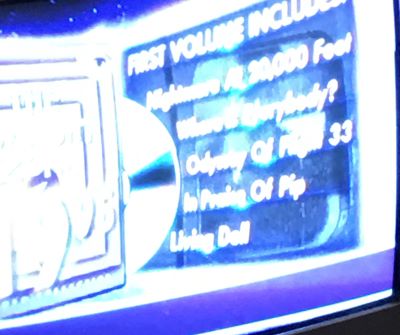
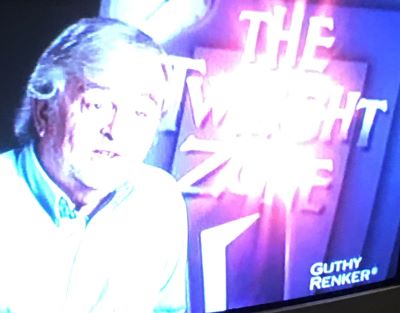
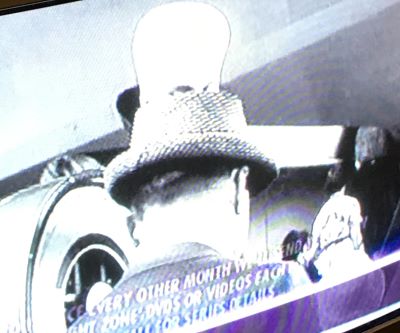
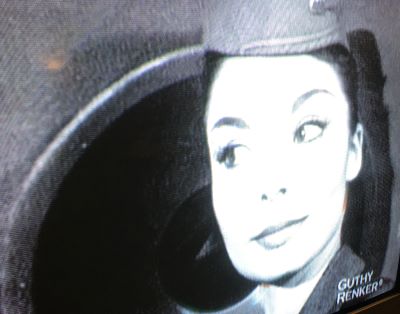
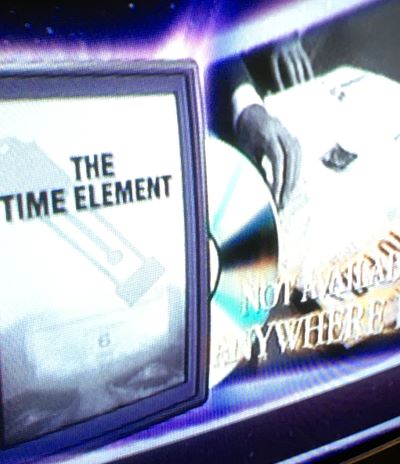
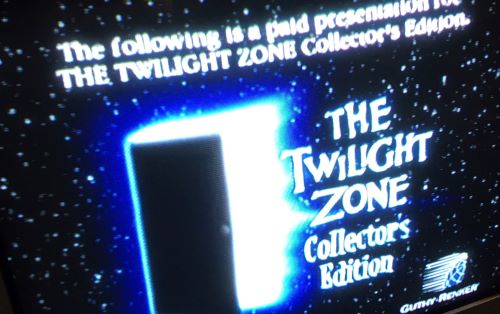
Saturnine also released two discs of many of Bernard Herrmann's stock music clips that he wrote for the CBS music library. Some of these were used for radio shows, including the anthology radio show "Brave New World", which was hosted by none other than Aldous Huxley. Some of these "Brave New World" clips were used in "The Obsolete Man" and "Mirror Image", two of the most popular episodes in the series.
The majority of these discs consist of stock music. As Saturnine states below (sorry I couldn't get a better pic of the DVD cover, the typeface was small and light), using stock music clips from the CBS music library was a more cost-effective alternative to having someone write a new score every week, which would've added another probably $1,000 or so (depending on the composer) to the production budget. And of course they could recycle cues from certain scores that were composed for earlier episodes. Case in point, Bernard Herrmann's score for the pilot episode, "Where Is Everybody", was recycled almost entirely for "The Last Flight" later in the first season. As a result, Herrmann got a second screen credit for it. Herrmann's music actually appears in countless other episodes, including some of the greatest in the series like "The After Hours" and "The Rip Van Winkle Caper" but he was not credited for those, because not all the cues were his.
I should add, some of the stock music clips were not composed in the United States. They were written by mostly European composers, and, presumably, purchased by CBS, and therefore no royalties had to be paid to those composers since they were out of the country and not affiliated with any music composers unions in the US, such as ASCAP. For a complete listing of almost every musical cue used on TZ, please consult Martin Grams' book on TZ.
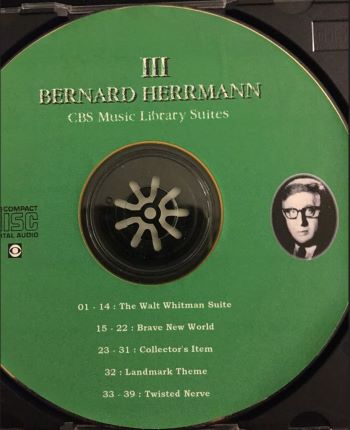
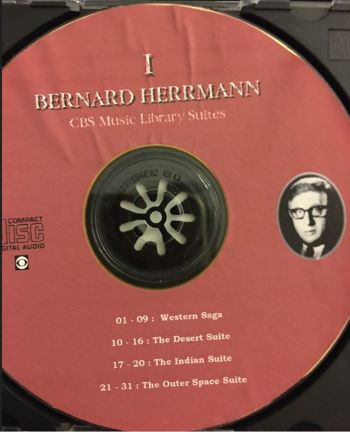
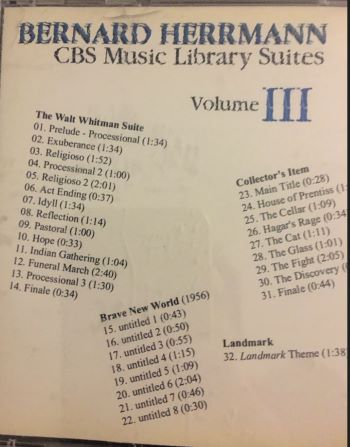
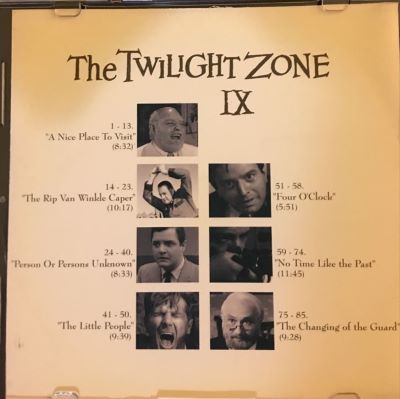
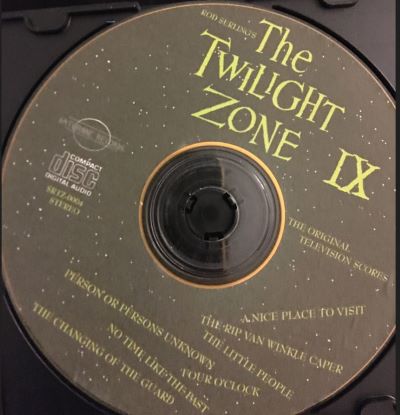
Note: This disc contains two episodes that were effectively "scored" by Wilfred Josephs (1927-1997), "The Little People" and "Four O'Clock". Some of the music heard in "One More Pallbearer" and "The Trade-Ins" also came from Josephs. These were all from the third season of the show. Josephs' music can be heard once in awhile in some other episodes as well. In "The Little People", where it was used most prominently, Josephs was not credited for any of the clips, as some of the music heard was by Marius Constant and Rene Garriguenc. But the Josephs pieces are as follows:
These very short pieces were similar to those written by US-based composers for the CBS library, including Jerry Goldsmith and quite a few others, some of whom were contracted by CBS as composers.
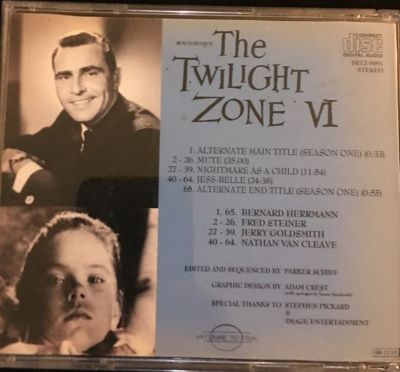
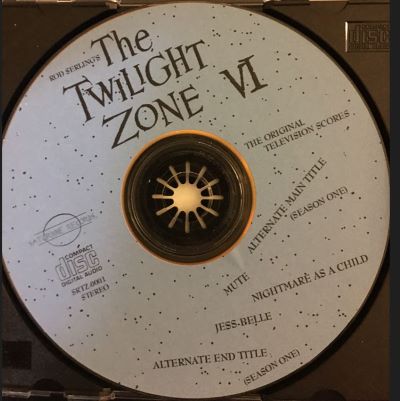
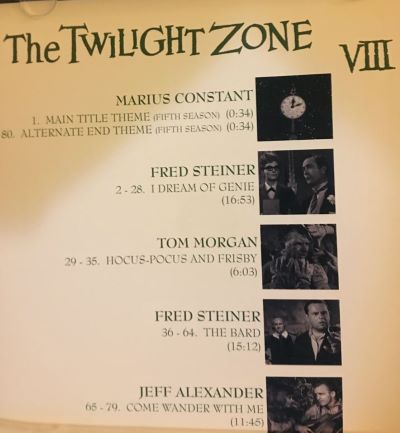
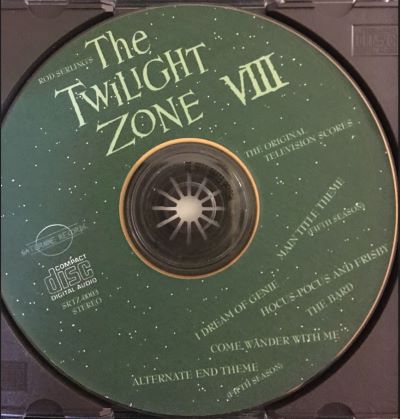
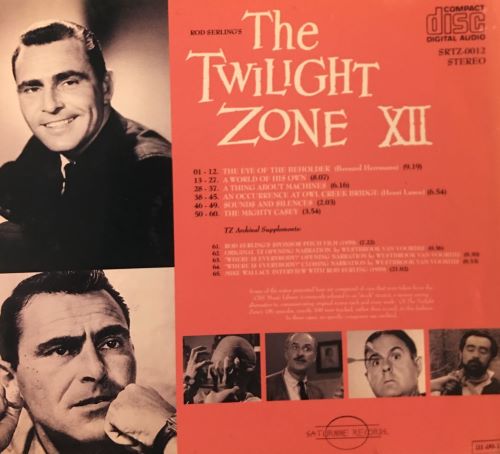
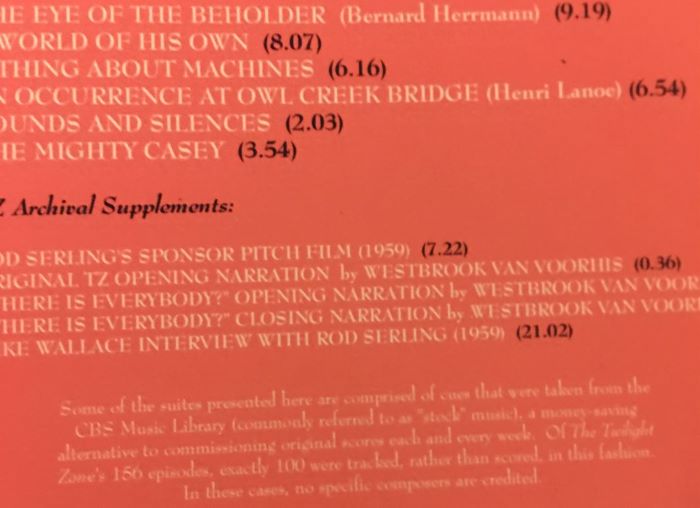
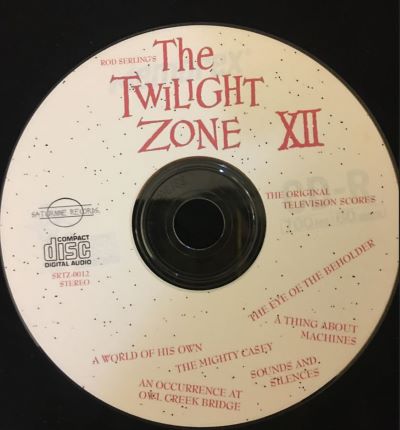
This was the final disc they issued. In all, there were about 12 CDs, including the 4 of the 40th anniversary soundtrack set. As that set was issued in 1999-2000, it is needless to say, out of print. And with CDs becoming rather obsolete as everything moves into digital streaming, it's unlikely that we will see a 65th anniversary re-release. To my knowledge, these tracks are not available on iTunes/Spotify/similar venues but can probably be found online someplace if you look hard enough. There are always people out there who will upload these kinds of things as bootlegs.
**Not shown: Penultimate disc with "Miniature" by Fred Steiner, "Passage on the Lady Anne" by Lucien Moraweck, conducted by Lud Gluskin, and "Little Girl Lost" by Bernard Herrmann. Surprisingly, this one was not included on the TZ 40th Anniversary soundtrack - like "Eye of the Beholder", "Little Girl Lost" remains a very popular episode. As Saturnine released these discs 20+ years ago now, and CD covers are not very robust, the ravages of time have acted upon them and even the ones you see above are not in one piece anymore!
In 2001, Bernard Herrmann's TZ scores were all re-recorded in the UK, with Joel McNeely conducting various small ensembles of players. These included: "Where Is Everybody", "Walking Distance", "The Lonely", "The Hitch Hiker", "Eye of the Beholder", "Little Girl Lost", "Living Doll", "Ninety Years Without Slumbering." The first three of these were re-released on the 40th Anniversary soundtrack, along with the Outer Space Suite. "The Hitch Hiker" score was written earlier for the radio production of it and most of it was used for the TZ production. This and the remaining three have not been re-released. It is a great testament to Bernard Herrmann that many people think that he wrote many more scores than these eight. This is probably because his music was so good that they recycled many times and is heard in dozens of TZ episodes. The recordholder of most TZ scores was Nathan Van Cleave (known as only Van Cleave) who wrote 12 of them. His scores included: "Elegy", "A World of Difference", "Perchance to Dream", "What You Need", "Two", "I Sing the Body Electric", "The Midnight Sun", "Jess Belle", "Steel", "A Kind Of Stopwatch", "From Agnes - With Love", and "Black Leather Jackets". The music heard in "Twenty-Two" is almost completely comprised of the score of "Elegy."
To date, the scores not released on any albums include the following:
Rene Garriguenc: "The Monsters Are Due On Maple Street", "In Praise of Pip", "Spur Of The Moment"
Lucien Moraweck: "Queen of the Nile", "The Purple Testament"
Lyn Murray: "A Passage For Trumpet"
Van Cleave: "What You Need", "From Agnes - With Love", "Black Leather Jackets", "A Kind Of Stopwatch"
Richard Shores: "Caesar and Me"
Leith Stevens: "Time Enough at Last"
William Lava: "Once Upon a Time"
Wilbur Hatch: "Still Valley"
Nathan Scott: "Young Man's Fancy"
Robert Drasnin: "The Hunt"
Laurindo Almedia: "The Gift"
Tommy Morgan: "Mr. Garrity and the Graves", "The Last Rites of Jeff Myrtlebank"
